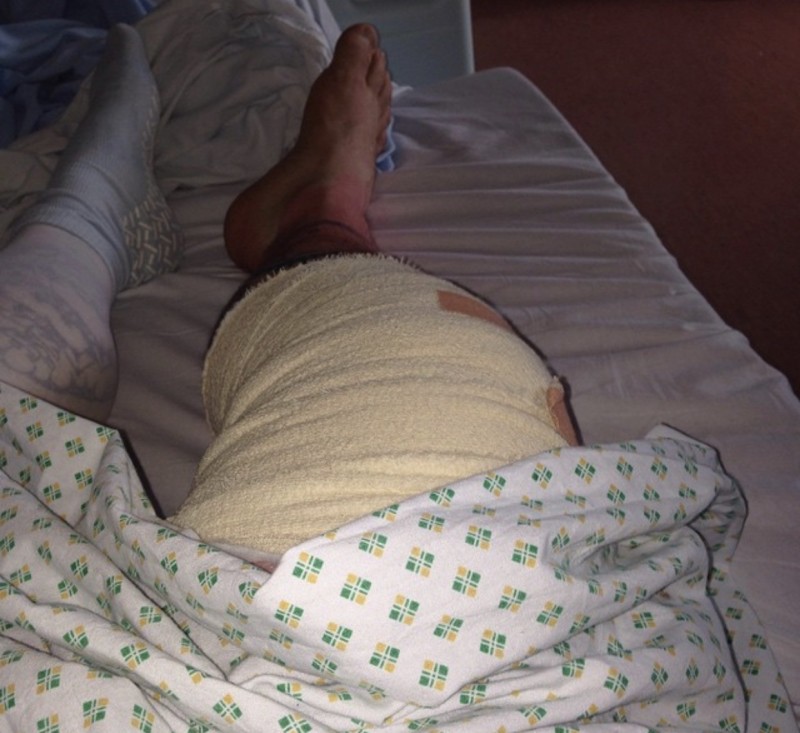
This is a subject that is very close to my heart but is very rarely spoken about. It’s a well-known saying and fact that you are only that one awful injury away from ending your sports career, be it football, rugby, or lifting. But it’s very misunderstood just how much our sometimes very fragile minds are so important to possibly overcome that career-ending injury.
When I had my injury, it became increasingly apparent to me just how important it was going to be to not only keep on top of my physical rehab but to also stay ahead of my mental rehab as well.
Before I go any further, please don’t if you read this take everything I’m saying as gospel, I’m not an expert and I don’t profess to be. There are some very learned people around where if any of this rings true to you that you may want to seek their services.
RELATED: If I Don't Have a Practitioner, Where Do I Go for Help?
Within my short remit for this article, I can merely touch on the amount of knowledge the experts have in this field. I’m just trying to get people thinking outside the box a little and possibly enlighten them a little.
So, with all that said, here I go.
Four years ago, I squatted 900 pounds for the first time and was on cloud nine. My training was going from strength to strength until one day the week before Christmas it all went wrong: 1,058 pounds was loaded; I unracked fine — I even remember thinking, “That doesn’t feel that heavy,” and snap! I went one way across the gym; the bar went the other; the pain, I won’t ever forget.
The accident was enough to bend a Westside Bulldog Squat Bar! I came round screaming in agony with Dave Beattie pretty much cradling me in his arms, begging him to tell me I’d still be able to squat.
He couldn’t.
Off to the hospital, I went where I was told I wouldn’t fit in the MRI scanner, and an appointment was made for the zoo. The funny side was lost on me at the time, especially when you’re told a rhino is being scanned after you.
Then came the results of my scan: complete rupture of my ACL, MCL damaged, patella tendon hanging on by a thread, meniscus cartilage in pieces, quad tendon detached from the bone, and I’d split my tibia down the middle.

I asked the consultant would I ever be able to squat competitively again and he replied, “You will be lucky if you can walk without a limp again if at all.” A lot of tears later, and he planted the patient consent to operate form in front of me. That was the beginning of the worst six months of my life.
I will admit now, the six months I spent trying to prove that consultant wrong nearly ruined me, and if it weren’t for having two amazing friends in my corner who wouldn’t let me give up, I don’t know if I would have gotten through it.
When faced with a serious injury, you go through five very distinct phases, which are pretty similar to grief when losing a loved one.
1. Denial
You won’t believe that it’s happened to you; in fact, you get very angry about it, going as far as to even attempt to continue training and carry on as you were before. Yes, I did this and ended up on the gym floor trying to squat just my bodyweight after having gone into the gym on crutches!
2. Desperation
You’ve finally accepted what’s happened and will do anything to be fixed. You will take anything offered and put your health on the line, just for a glimmer of a chance to compete again. This seems to be happening a lot more recently with the number of athletes coming back from injury who are then found positive for banned substances! Must be the “whatever it takes” attitude.
WATCH: Joe Sullivan Rants — Go to Therapy!
3. Depression
So you did the deal with the devil or you collapsed on the floor in the consultant’s room, begging for them to fix you (as I did), and you’re still faced with months of inactivity and are not able to participate in the sport you spent far too much time being devoted to, only for it to spit you out and forget about you. That’s when you really start doubting.
Your social media is full of people lifting PRs, and you’re stuck watching TV on crutches or in a plaster cast. I deleted everyone related to lifting from my social media when I was laid up, which was the worse thing I’ve ever done, as it further isolated me from the sport I loved.
4. Acceptance
You finally have your diagnosis, after having every part of you x-rayed, MRI-scanned, ultrasounded, cut up and stitched back together, given a sheet of exercises to do, and told to come back in two months with your progress. You’ve got your head out of the darkness and realised that you need to get up and get better. You know it’s going to be hard starting again, but you know it’s going to happen, so you get on with it.
5. Rehabilitation
You’ve learned to walk again or open a can of beans, so it’s time to get lifting again. You’ve exhausted the sheet the surgeon gave you, and now you want back on the platform. You find a physio, and the hard work truly begins.
This was when my mental health was truly tested. I’d already been through hell through the other four phases as well as going through a lot in my personal life, so being pushed to tears twice a week by a physio knocked me for six to say the least.
All of that barely touches on the fact that a lot of lifters, myself included, use their training as a very rudimentary and simple form of coping and getting through what their often hectic and stressed lives throw at us. You suddenly take away that coping mechanism and anything that was bubbling away in your saucepan of life that was kept at bay by training is then left to boil over and create havoc.
If you're ever faced with a potentially career-ending injury, remember: There have been a lot of lifters that have been through similar and knowing them, they will be more than happy to talk to you about what happened to them and how they got through.
Delroy McQueen had a massive elbow surgery. The legendary Andy Cusick came back from a broken back. Andy Bolton, with all that he is going through, is refusing to stop lifting and is one lifter that I know will talk to you about what your going through and can relate.
That’s just scraping the surface of lifters that have seen it and came back from injuries that probably could have finished their lifting, but they came back to become not only champions but world contenders who were offering me massive support and advice hours after my injury.
READ MORE: Returning From Injury After a Layoff
If you do ever face the prospect of being injured and a long lay off but don’t want to seek the advice of a professional, there are reams and reams of articles on the web that offers. There’s so much practical advice on allowing you to turn that corner and get you positive again and some of it is as simple as getting back in that team environment — if you’re lucky to have one. Go to the gym for a coffee or protein shake with the owner, and you will be amazed how many of them say, “We were going to call you but didn’t want to upset you,” when the truth is all you wanted was one of them to ring you. And just from personal experience, squatting 881 pounds plus again is a lot easier than learning to run again.
To sum it all up, remember your body is amazing at fixing itself. Give it a chance, get yourself an awesome physio, and look after that brain of yours, and you will soon be back stronger than you were before.
Header image courtesy of Yuriy Klochan © 123rf.com
Steve “Tubby” MacNeil is 35 years old and lives outside Manchester in the UK with his girlfriend, step-kids, and two British shorthair cats (soon to be four). He’s been lifting for 10 years, mostly in multi-ply and dabbling in single-ply. In the latter, he holds a couple of WPC single-ply world records. His best lifts are a 992-pound squat, a 744-pound bench, and a 683-pound deadlift. When he’s not preparing for his next meet (at the time of publication, he’s prepping for the Irish Pro in late September), Tubby coaches around 20 lifters, both face-to-face and remotely.











1 Comment